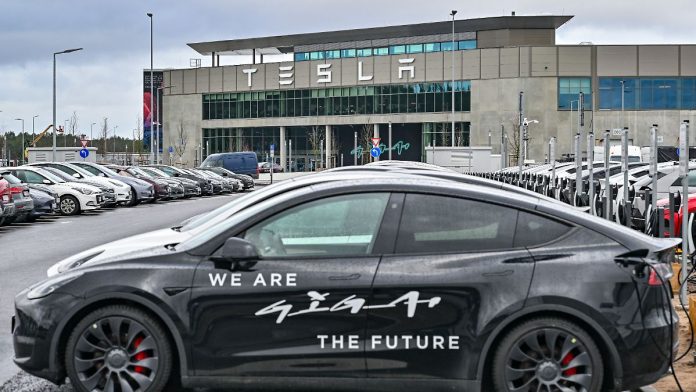Plant in Brandenburg
How the citizens' vote influences the Tesla plans in Grünheide
This audio version was artificially generated. More info | Send feedback
The US electric car manufacturer Tesla has suffered a setback by voting no in the citizen survey in Grünheide about the expansion of its only car factory in Europe. The clear vote of almost two thirds against does not only put the company under pressure. It is now also the turn of the municipal council, which still has to decide on the development plan for the expansion. The citizens' vote has weight – even if it is not legally binding.
Why does Tesla want to expand its factory premises?
The plant was opened less than two years ago in the presence of company boss Elon Musk. Tesla already has expansion plans and wants to increase production capacity from the milestone of 500,000 cars per year, which has not yet been reached, to one million cars per year. Tesla needs enough logistics space for this.
It is also about greater delivery security. Car production had to stop for around two weeks this year because parts were missing due to the uncertain situation in the Red Sea. According to Tesla, a freight station should ensure more environmentally friendly transport that will relieve traffic in the region. The company is also planning a company daycare center.
What is the legal significance of the citizens’ vote?
No. In December 2022, the Grünheide municipal council voted with a majority to draw up a new development plan so that Tesla can expand the factory site by 170 hectares, which would involve clearing more than 100 hectares of forest. However, community representatives still have to decide on the development plan itself. The result of the survey is an important basis for the decision.
How does it go from here?
The municipality of Grünheide has the decision to set the course for the “B-Plan” in its hands. After the result, Mayor Arne Christiani said that the rejected development plan would no longer be presented to community representatives in its current form. The committee will next meet on March 14th and then on May 16th.
The state parliament's finance committee would also have to approve a sale of the area by Brandenburg's state forestry company. According to the Ministry of the Environment, the state government had already promised Tesla the acquisition of another area in 2019 – subject to development plan law.
Will Tesla stick to its plans?
The company is sticking to its goal of shifting truck traffic to rail, but is aware of the concerns and has signaled its willingness to cooperate. “We see that the citizens of Grünheide have concerns in connection with the planned area expansion,” said Tesla. “We will coordinate further steps with everyone involved based on the feedback from the last few weeks.”
How does Brandenburg's government react to the citizens' rejection?
It's about nothing more and nothing less than the acceptance of major projects. Tesla is Brandenburg's industrial driving force with around 12,500 employees.
Prime Minister Dietmar Woidke is cautiously applying pressure: “Now it's about Tesla and the municipality of Grünheide evaluating the information and concerns and reacting to them.” He also demands transparency.
Are there comparable cases of a citizens' vote in Germany?
Things went the other way around in Bavaria last year. Opponents of a battery plant run by the German car manufacturer BMW failed in their attempt to prevent construction in September 2023. The citizens of the town of Straßkirchen in Lower Bavaria decided by a large majority in favor of the settlement. This initiative against the construction, which would destroy around 100 hectares of fields, was unsuccessful in a referendum. The settlement is expected to bring 3,200 jobs – around a quarter of Tesla's current number of employees in Grünheide.


